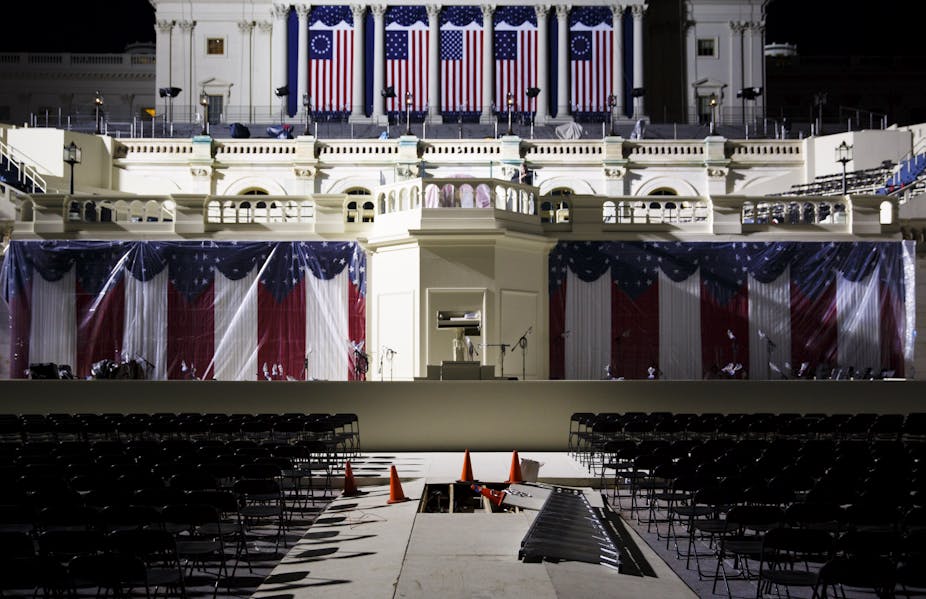All eyes are now on Donald J. Trump’s impending inauguration, which takes place in Washington DC, on January 20, and whose centrepiece is the inaugural address. But despite the attention lavished on these speeches by aides, speechwriters, newspaper columnists and pundits, few of them earn a place in history.
There are, of course, some magnificent exceptions. Think of Abraham Lincoln’s (futile) 1861 appeal to “the better angels of our nature”, or his pledge, in his second inaugural, to act “with malice toward none, with charity for all” as America’s bloody Civil War neared its end. The 20th century, meanwhile, boasts Franklin Delano Roosevelt’s “the only thing we have to fear is fear itself” and John F. Kennedy’s promise to “pay any price, bear any burden, meet any hardship, support any friend, oppose any foe, in order to assure the survival and the success of liberty”.
But even the most obsessive of fans would struggle to argue for Zachary Taylor’s 1849 pledge to “renew the declarations I have heretofore made and proclaim my fixed determination to maintain to the extent of my ability the government in its original purity”, or Lyndon Johnson’s declaration that “the hour and the day and the time are here to achieve progress without strife, to achieve change without hatred”. Neither have exactly echoed through the ages.
Inaugurals are also a far from reliable guide to presidential performance. John F. Kennedy’s rhetoric may have been stirring, but his commitment to “pay any burden” looked decidedly less clever in the aftermath of America’s disastrous experience in Vietnam.
Meanwhile, both George W. Bush’s promise to govern as a compassionate conservative and Barack Obama’s determination to put aside the “petty grievances” and “recriminations” that “have strangled our politics” ended up being swept aside by larger forces beyond their control.
What precedent, then, for Trump? Sixty-odd years ago, another Republican, Dwight David Eisenhower, was celebrating a smashing victory over a humiliated Democratic opponent. Like Trump, “Ike’s” top advisers included some of the wealthiest men in America; wags quipped that his first cabinet consisted of “nine millionaires and a plumber” (the plumber being his labor secretary, Martin Durkin, erstwhile head of the plumbers and pipe-fitters union).
Like Trump, the golf-loving Eisenhower was widely viewed as bumbling and gaffe-prone, and far less clever than his vanquished opponent, Adlai Stevenson. He was also the last man to win the White House without any prior experience of elected office – but the contrasts between Eisenhower and his 21st century successor could scarcely be starker.
Ideals, aspirations and hopes
Whereas Eisenhower advocated leadership through “persuasion and conciliation and patience”, Trump’s presidential campaign orbited his own ego. He has clashed repeatedly with both his own party and the nation’s intelligence and security establishment, and thrown insults with shameless abandon; recent targets include Meryl Streep and civil rights icon John Lewis.
While it is true that, in his second inaugural, Eisenhower looked forward to “that day” when the American and Russian peoples would “freely meet in friendship”, NATO’s first Supreme Commander would likely be horrified by Trump’s apparent willingness to undermine the Western military alliance, as well as his seemingly relaxed attitude towards Vladimir Putin’s annexation of Crimea and menacing of Ukraine.

While Eisenhower denounced the “technique of pitting group against group for cheap political advantage”, Trump has suggested that women who have abortions should be “punished”, denigrated Mexican immigrants as “criminals” and “rapists”, mocked the disabled, called for a “total and complete shutdown on Muslims entering the United States”, and declared that “if black lives matter, then go back to Africa. We’ll see how much they matter there”.
He has also, as a recent article in The Nation put it, “chosen a white nationalist as his chief strategist and a white-nationalist sympathiser as his pick for Attorney General”.
Whereas Trump has promised to build a wall between the US and Mexico, tear up free trade agreements, and pursue an “America First” policy, in his 1957 inaugural address, Eisenhower warned that:
No people can live to itself alone. The unity of all who dwell in freedom is their only sure defense. The economic need of all nations – in mutual dependence – makes isolation an impossibility: not even America’s prosperity could long survive if other nations did not also prosper. No nation can longer be a fortress, lone and strong and safe. And any people, seeking such shelter for themselves, can now build only their own prison.
Some six decades ago, Eisenhower could boast with some conviction that the Republican Party was a party that looked “to the future”, which represented the “ideals, the aspirations and the hopes of Americans”, and which was committed to enabling all citizens – “regardless of any accident of birth, of station, of race, religion, or color” – to share in the American Dream.
In his victory speech, Trump did speak of “reaching out” to his opponents, harnessing the “creative talents of our people”, and launching a “project of national growth and renewal”, but no amount of conciliatory rhetoric could overwrite the ugliness of the 2016 campaign. And no matter what the 45th President of the United States has to say for himself, his narcissism, pettiness and apparent authoritariansim are already plain to see.

